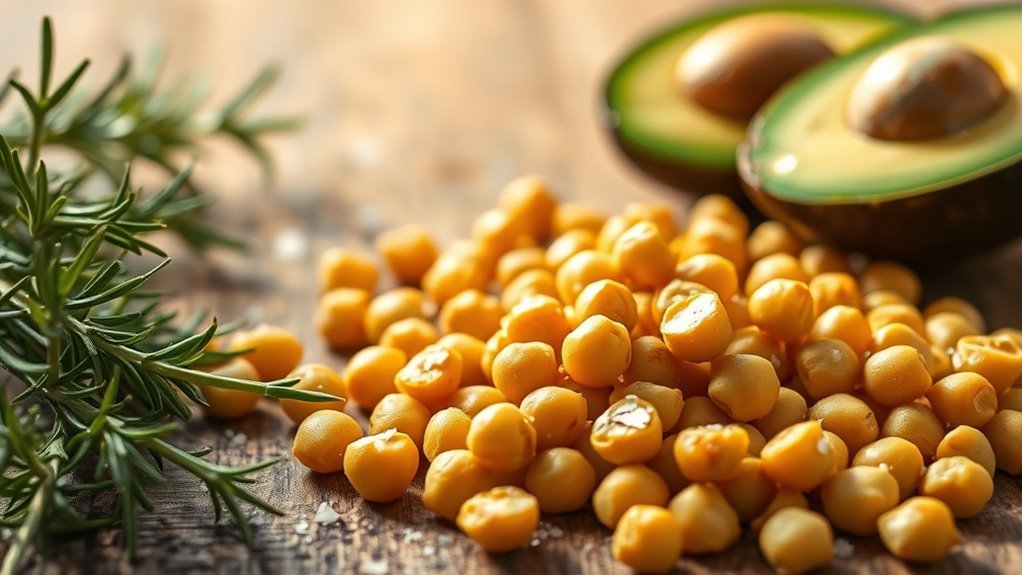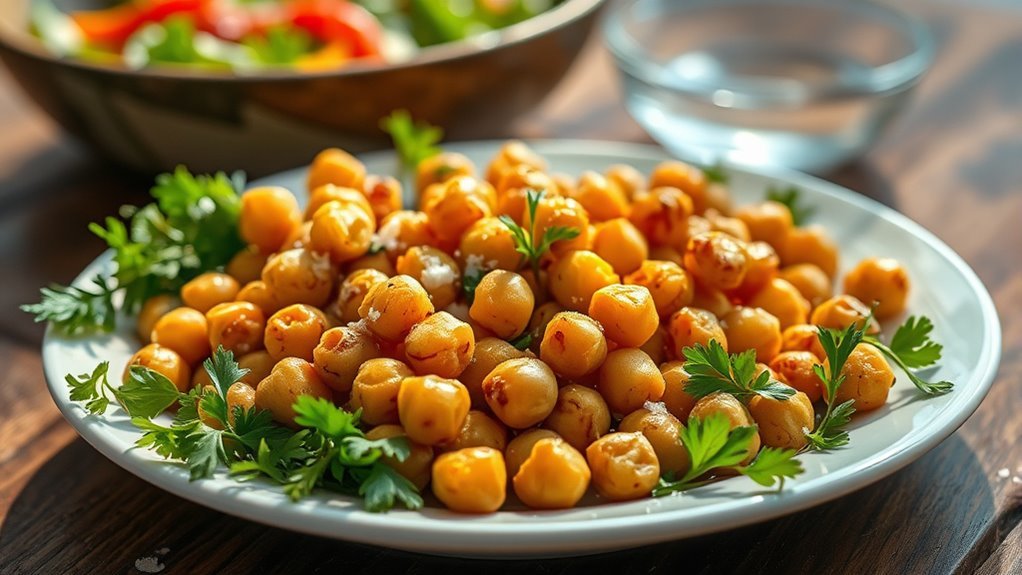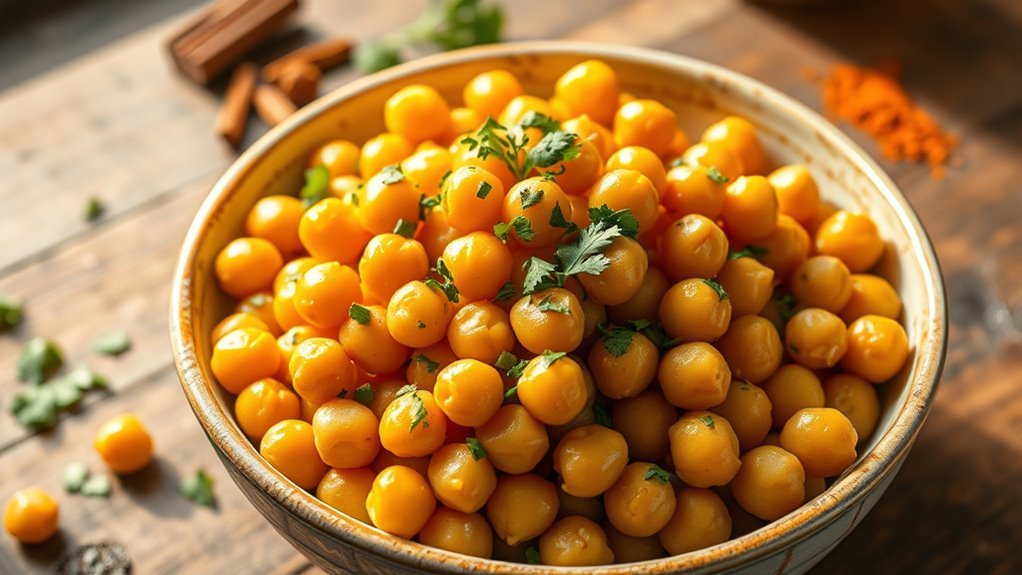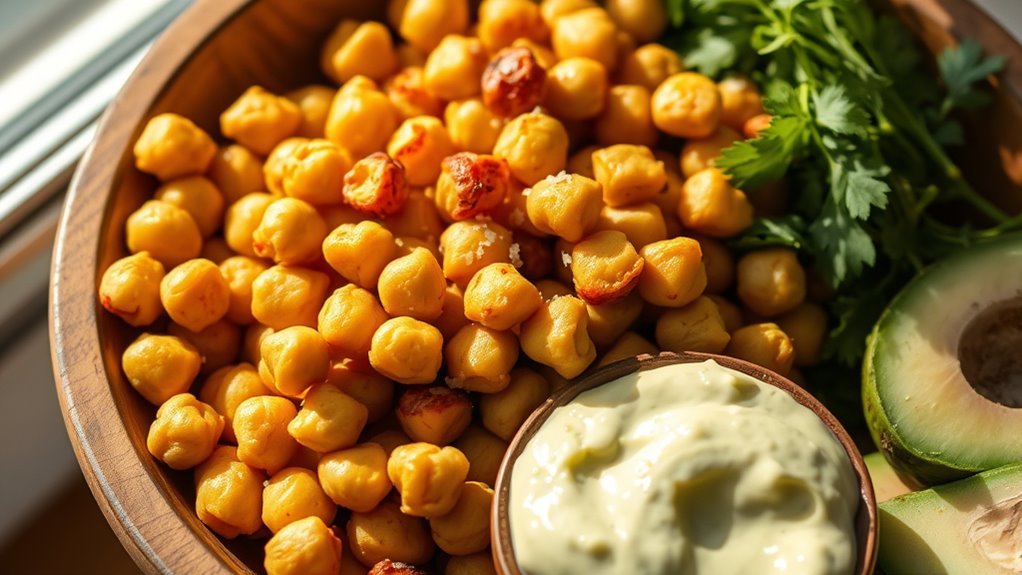Chickpeas aren’t typically considered keto-friendly due to their higher carbohydrate content, with about 27 grams per cup. This can pose a challenge for those following a strict ketogenic diet. However, you can enjoy them in moderation by incorporating small amounts in salads or hummus. Their rich fiber and protein content offer health benefits, aiding digestion and helping with appetite management. If you’re curious about how to balance chickpeas in your low-carb lifestyle, there are more insights ahead.
Nutritional Profile of Chickpeas

When considering the nutritional profile of chickpeas, you’ll find a powerhouse of essential nutrients packed into these legumes. Chickpeas come in several varieties, including garbanzo and black chickpeas, each offering unique flavors and benefits. They’re rich in protein, fiber, vitamins, and minerals, making them a great addition to a balanced diet.
Different cooking methods, like boiling, roasting, or blending into hummus, can enhance their nutritional value and taste. Boiling preserves most nutrients, while roasting adds a delightful crunch. If you’re looking for versatility, chickpeas can be incorporated into salads, soups, and stews, providing a satisfying and nutritious element. Embracing these legumes can empower your culinary freedom while nourishing your body.
Carbohydrate Content in Chickpeas

When considering chickpeas on a keto diet, understanding their carbohydrate content is essential. You’ll want to look at the overall nutritional profile and calculate net carbs based on portion sizes to make informed choices. This way, you can effectively manage your carb intake while still enjoying the benefits of chickpeas.
Nutritional Profile Overview
Chickpeas, a popular legume, offer a unique nutritional profile that’s often of interest to those following a ketogenic diet. While chickpea varieties differ in their carbohydrate content, they generally provide a rich array of nutrients. When considering cooking methods, remember that preparation can influence overall nutrition.
Here’s what you can expect from chickpeas:
- High in plant-based protein for muscle support
- Rich in fiber, aiding digestion and satiety
- Packed with vitamins and minerals like folate and iron
- Low in fat, making them heart-healthy
- Versatile for various dishes, from salads to stews
While they can be a wholesome addition to your meals, moderation is key if you’re aiming for a strict keto lifestyle.
Net Carbs Calculation
Although they’re nutritious, understanding the net carbohydrate content of chickpeas is essential for anyone on a ketogenic diet. Chickpeas contain approximately 27 grams of total carbohydrates per cup, but when you factor in dietary fiber—about 8 grams—your net carbs estimation drops to around 19 grams. This might be higher than some other legumes, making chickpea alternatives like zucchini or cauliflower more appealing for those strict on keto. If you’re looking for low-carb options, exploring these alternatives can help you maintain your macro goals while still enjoying diverse meals. Always consider your individual carb limits and how chickpeas fit into your overall dietary plan, especially if you’re aiming for ketosis. Balancing nutritional needs is key!
Portion Size Considerations
While it’s tempting to enjoy a hearty serving of chickpeas due to their nutritional benefits, portion size plays a crucial role in managing carbohydrate intake on a ketogenic diet. To maintain effective portion control, consider these serving suggestions:
- 1/4 cup cooked chickpeas: about 6 grams of net carbs
- 1/2 cup cooked chickpeas: around 12 grams of net carbs
- Add spices and herbs: enhance flavor without extra carbs
- Pair with low-carb veggies: balance your meal effectively
- Use as a topping: sprinkle on salads for added texture
Fiber and Protein Benefits

The impressive fiber and protein content of chickpeas makes them a remarkable addition to any diet, including a ketogenic one. Their high levels of dietary fiber offer significant health benefits, such as improved digestion and enhanced satiety, helping you feel full longer. This is particularly valuable when you’re aiming to manage your appetite on a low-carb plan. Additionally, chickpeas provide a solid source of plant-based protein, which supports muscle maintenance and overall wellness. Incorporating them into your meals can help you achieve a balanced intake of essential nutrients while still enjoying the freedom of flavorful dishes. So, if you’re looking to diversify your protein sources and boost your fiber intake, chickpeas might just be the perfect choice for you.
Glycemic Index of Chickpeas
When considering chickpeas in your keto diet, understanding their glycemic index (GI) is essential. Chickpeas have a moderate GI, which means they can affect blood sugar levels differently compared to other beans. This insight can help you make informed choices about how to incorporate them into your meals.
Glycemic Index Overview
Chickpeas, often celebrated for their nutritional benefits, have a glycemic index (GI) that plays an essential role in understanding their impact on blood sugar levels. With a moderate GI, they can promote better glycemic control and a more balanced insulin response. Here are some key points to reflect upon:
- Provide a steady source of energy
- Help prevent sudden blood sugar spikes
- Contain fiber that aids digestion
- Support heart health with beneficial nutrients
- Offer versatility in meal preparation
Incorporating chickpeas into your diet may enhance your ability to manage blood sugar effectively. They’re a satisfying option that aligns well with your lifestyle, allowing you the freedom to enjoy nutritious meals without compromising your health goals.
Comparison With Other Beans
While many beans offer health benefits, their glycemic index can vary considerably, making chickpeas a remarkable option for those monitoring blood sugar levels. Chickpeas have a glycemic index of about 28, which is relatively low compared to other bean varieties like kidney beans (GI 29) and black beans (GI 30). This means they cause a slower rise in blood sugar, which is a critical factor for those on a keto diet. The chickpeas benefits extend beyond their glycemic index; they are also rich in fiber and protein. By incorporating chickpeas into your meals, you can enjoy a satisfying food that helps maintain stable blood sugar levels while still providing essential nutrients, unlike some higher-GI beans.
Impact on Blood Sugar
Understanding the glycemic index of foods is essential for those managing their blood sugar levels, especially on a keto diet. Chickpeas have a moderate glycemic index, which can impact blood sugar regulation. Here’s how they might affect you:
- Slow-digesting carbs that provide sustained energy
- A good source of fiber helping to stabilize blood sugar
- Rich in protein, supporting muscle maintenance
- Nutrient-dense, offering vitamins and minerals for overall health
- Versatile in meals, making them easy to incorporate
While chickpeas can fit into your diet, moderation is key. They can provide benefits, but it’s vital to monitor how they fit into your personal blood sugar management plan. Enjoy them wisely!
Chickpeas in a Ketogenic Diet
When considering a ketogenic diet, you might wonder how chickpeas fit into the equation. While they’re packed with protein and fiber, their higher carb content can be a concern. A single serving of chickpeas contains about 27 grams of carbs, which may limit your daily intake on keto. However, you can still enjoy chickpea recipes in moderation or explore keto alternatives to satisfy your cravings.
| Nutrient | Chickpeas (1 cup) | Keto Alternatives (1 cup) |
|---|---|---|
| Carbohydrates | 27g | 5g (Cauliflower Rice) |
| Protein | 15g | 10g (Tofu) |
| Fiber | 12g | 2g (Zucchini Noodles) |
Ultimately, balance is key in any diet.
Alternatives to Chickpeas on Keto
If you’re looking to replace chickpeas in your ketogenic diet, there are several low-carb alternatives that can satisfy your cravings without compromising your carb limits. These keto substitutes not only keep your meals exciting but also align with your dietary goals. Here are some great low-carb options:
- Cauliflower: Perfect for making rice or mash.
- Zucchini: Versatile for noodles or fritters.
- Eggplant: Great for stews or grilled dishes.
- Green Beans: Crunchy and can be added to salads.
- Mushrooms: Excellent for adding a savory, meaty flavor.
How to Incorporate Chickpeas in a Low-Carb Diet
While chickpeas are often considered too high in carbs for a strict ketogenic diet, there are ways to incorporate them in moderation that can still align with your low-carb goals. You can enjoy chickpeas in small servings, such as adding them to salads or blending them into hummus. Consider using chickpea flour for low-carb snacks like crackers or pancakes, which can be a satisfying alternative to traditional options. Explore various chickpea recipes that emphasize low-carb ingredients, ensuring you maintain a balanced intake. Remember, portion control is key; a small serving can provide fiber and protein without derailing your diet. By being mindful of how you use chickpeas, you can enjoy their unique flavor while sticking to your low-carb lifestyle.
Potential Health Benefits of Chickpeas
Chickpeas are packed with protein and fiber, making them a great addition to your diet for promoting satiety and muscle health. Their nutrient-dense profile means they offer vitamins and minerals that can support overall wellness. By incorporating chickpeas, you might find a tasty way to enhance your nutritional intake while following a low-carb lifestyle.
High Protein Content
Packed with protein, chickpeas offer a substantial nutritional profile that can benefit those seeking to enhance their dietary intake, especially on a keto diet. As a versatile protein source, they can easily fit into your meal planning. Here are some potential benefits of incorporating chickpeas into your meals:
- High protein content to support muscle maintenance
- Essential amino acids for overall health
- Aids in satiety, helping you feel fuller longer
- Supports energy levels for an active lifestyle
- Versatile ingredient for a variety of dishes
Rich in Fiber
Alongside their high protein content, chickpeas are also rich in fiber, which can considerably enhance your overall health. Fiber sources like chickpeas promote digestive health by aiding in regular bowel movements and preventing constipation. With a good amount of soluble fiber, they can help regulate blood sugar levels, making them a smart choice for anyone mindful of their carbohydrate intake. Additionally, fiber keeps you feeling full longer, which can be beneficial for weight management. Incorporating chickpeas into your diet not only boosts your fiber intake but also supports heart health by lowering cholesterol levels. So, if you’re seeking a nutritious, versatile option, chickpeas could be a fantastic addition to your meals.
Nutrient-Dense Superfood
Although you might not think of them as a superfood, chickpeas are incredibly nutrient-dense and offer a range of health benefits. Different chickpea varieties pack unique nutrients, making them a versatile choice for your diet. Here are some superfood benefits you’ll enjoy:
- High in protein: Supports muscle health and repair.
- Rich in vitamins: Especially B vitamins, essential for energy metabolism.
- Loaded with minerals: Provides essential nutrients like iron and magnesium.
- Supports gut health: Thanks to their fiber content, they promote healthy digestion.
- May aid weight management: Helps you feel fuller longer, reducing cravings.
Incorporating chickpeas into your meals can be a delicious way to boost your overall health while enjoying these fantastic superfood benefits.
Common Misconceptions About Chickpeas
While many people associate chickpeas primarily with vegetarian or vegan diets, it’s a common misconception that they don’t fit into a ketogenic lifestyle. Chickpea myths often stem from their carbohydrate content, leading some to believe they’re off-limits. However, it’s vital to evaluate portion sizes and overall meal composition. A small amount of chickpeas can provide valuable nutrients and fiber without derailing your keto goals. Keto misconceptions can cloud judgment, but understanding that not all carbs are equal is significant. When consumed mindfully, chickpeas can enhance your meals without sacrificing your dietary freedom. Embracing a balanced perspective allows you to enjoy chickpeas while maintaining a ketogenic approach, debunking the myths that restrict your food choices.
Making Informed Choices on Keto
When you’re maneuvering through the ketogenic diet, making informed choices is essential to guarantee you meet your nutritional goals without compromising your health. Effective meal planning can help you navigate dietary restrictions while enjoying a variety of foods. Here are some key considerations:
- Prioritize low-carb vegetables like spinach and zucchini.
- Choose healthy fats such as avocados and olive oil.
- Incorporate protein sources like grass-fed meat and eggs.
- Monitor your carb intake carefully, especially with foods like chickpeas.
- Experiment with keto-friendly recipes for variety and satisfaction.
1. Are chickpeas considered keto-friendly?
Chickpeas are generally not considered keto-friendly due to their relatively high carbohydrate content. A 100-gram serving of cooked chickpeas contains approximately 27 grams of carbs, which can easily exceed the typical daily carbohydrate limit for a ketogenic diet. While they are nutritious and provide protein and fiber, those following strict keto guidelines may need to limit or avoid chickpeas.
2. How many carbs are in chickpeas?
In a 100-gram serving of cooked chickpeas, there are around 27 grams of carbohydrates. Out of these, about 7-8 grams are dietary fiber, which can be subtracted from the total carbohydrate count to calculate net carbs. Thus, the net carbs in chickpeas amount to approximately 19-20 grams per 100 grams, making them a substantial source of carbohydrates in a keto diet.
3. Can chickpeas be included in a low-carb diet?
Chickpeas can be included in a low-carb diet, but moderation is key. If your low-carb approach allows for a higher carb intake than a strict ketogenic diet, then chickpeas can be enjoyed in small amounts. They offer beneficial nutrients like protein, fiber, and vitamins, which can contribute to overall health. However, it’s essential to monitor portion sizes to stay within your carbohydrate limits.
4. What are some keto-friendly alternatives to chickpeas?
For those following a ketogenic diet, there are several alternatives to chickpeas that are lower in carbohydrates. Options include cauliflower, zucchini, or even black soybeans, which have a much lower carb count. Additionally, nuts and seeds such as almonds or pumpkin seeds can be excellent substitutes, providing healthy fats and protein without the high carbs associated with chickpeas.
5. How can I enjoy chickpeas while on a keto diet?
If you’re keen on including chickpeas in your diet while following keto, consider using them in very small portions as part of a larger dish that is low in carbs. For example, you might incorporate a few chickpeas into a salad loaded with leafy greens, healthy fats, and low-carb vegetables. Alternatively, consider using chickpea flour in small amounts to create keto-friendly recipes, ensuring you balance the meal with high-fat, low-carb ingredients.
References
- https://www.healthline.com/nutrition/keto-diet-foods#legumes
- https://www.ncbi.nlm.nih.gov/pmc/articles/PMC6831240/
- https://www.mayoclinic.org/healthy-lifestyle/nutrition-and-healthy-eating/expert-answers/keto-diet/faq-20461807
- https://www.webmd.com/diet/obesity/what-is-the-keto-diet
- https://www.dietitians.ca/Health-Professionals/Resources/Guidelines/Nutrition-Questions/Legumes-and-the-Keto-Diet.aspx
- https://www.cdc.gov/healthyweight/healthy_eating/index.html


